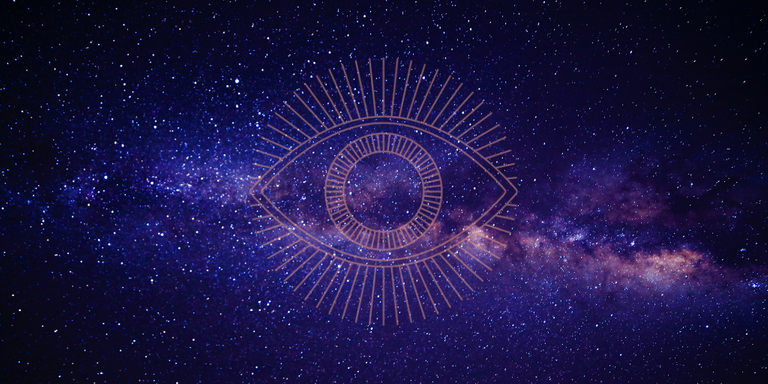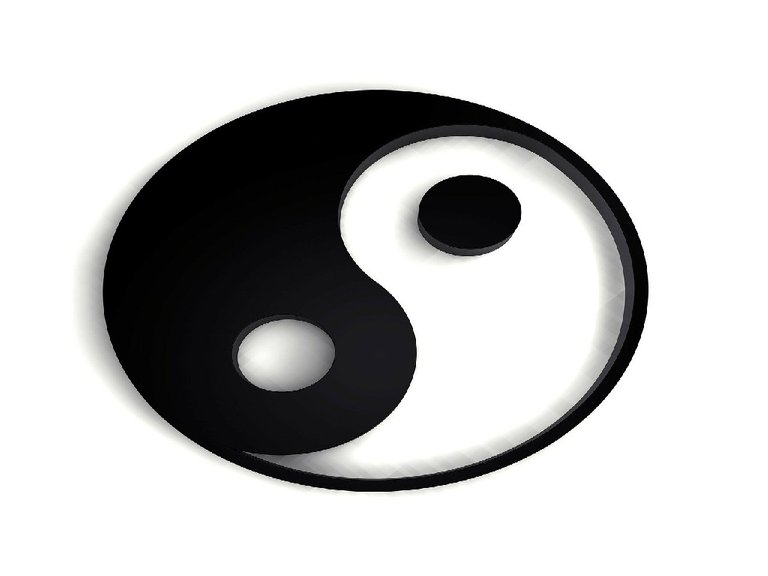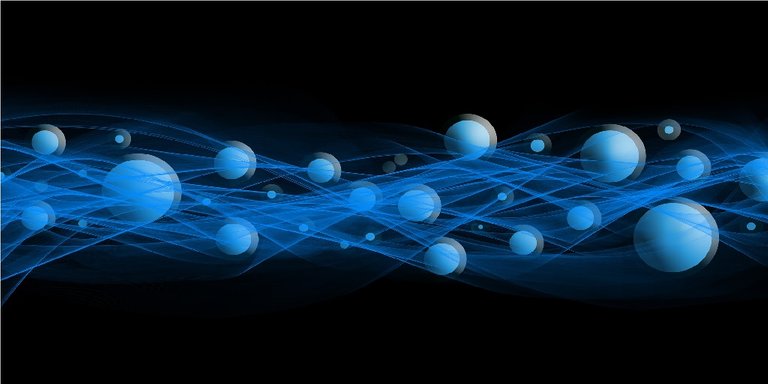Universal Consciousness: The Theory That Unifies All Theories About the Nature of the Universe [ENG/ESP]
The discoveries and advances of the last decades in the field of quantum physics now allow scientists to have a common perspective from which they can unify all the theories about the nature of the universe and matter in an elegant and rational way.
However, what scientists know today was already known by philosophers, mystics, and theologians thousands of years ago:
Consciousness is a fundamental part of matter, and without it, the universe probably couldn’t exist.
Different perspectives to explain the nature of the universe
Since ancient times, many sages have expressed, by different means, their conception of what the ultimate reality of this universe is.
For example, philosophy, through rational analysis, presents two lines of thought to explain the nature of the universe and reality.
On the one hand, absolute reality has always existed and we can all perceive it in the same manner. For example, the sun gives us light and heat.
On the other hand, perceived reality depends on the individual who observes it and can be interpreted as a shade of the color of absolute reality. For example, on a sunny day, some people will feel hotter than others.
However, within philosophy, there are also different lines of thought that place greater emphasis on one approach or the other.
For their part, mystics, through meditation, contemplation, and philosophy, have come to the conclusion that the ultimate reality is related in one way or another to the mind.

Consciousness permeates everything, according to some scientific theories.
Through introspection and exploration of different levels of consciousness, mystics have come to the conclusion that this universe is nothing more than an illusion born of a supreme consciousness.
If you think about it, this approach is not different from the idea of God that religion proposes.
That is, all religions pose God as a conscious being who creates with their mind by exercising their will.
For its part, thanks to complex devices and the scientific method, modern science has reached conclusions very similar to those raised by philosophy, mysticism, and religion regarding the importance of consciousness to explain reality and the nature of the universe and matter.
The universe is not what it seems
According to traditional physics, an object is real because it has definite properties that are independent of observation and measurement. Also, a real object can be affected by its immediate environment (e.g., the effect of rain on soil).
That means that a real object exists regardless of whether or not you perceive it with your physical senses.
For example:
A diamond will be a diamond for all eternity, even if you don't see it.
However, according to the theory of quantum physics, objects (particles in this case) can actually have different states, exist in different realities simultaneously, and lack definite properties before measurement or observation.

Did the ancient Chinese know the true nature of the universe?
In other words, the fundamental nature of the universe has no definite form unless there is a “conscious intention” to observe a definite form.
This contradicts the theory of local realism proposed by classical physics.
Does this mean that the universe is a product of consciousness?
And if so, of whose consciousness?
The role of the mind
Modern science now knows that the particles that make up matter, such as electrons, neutrons, etc., aren’t simply particles with a definite physical form.
The truth is that at the quantum level, particles have a dual nature; they can be a wave that moves as energy without any definite form, or they can be a particle with a definite spin (up or down).
By default, the universe has a random nature. You could say that, in essence, the universe and matter are pure energy. However, it seems that this energy can only take a definite form (for example, a particle) when it contains certain information.
I'm not the one who says this; this was already proven in the famous double-slit experiment carried out during the 19th century.
This famous experiment helped clarify that at the subatomic level, there is some kind of interaction between matter and consciousness.
Is the universe then pure energy and information in its most elemental nature?
Probably.

Matter is made of waves and it only takes the form of particles when it has certain information
The truth is that nowadays, more and more people within the scientific community are looking towards theories that see consciousness as a key element in explaining the nature of the universe.
One of these theories is panpsychism.
Panpsychism explains that everything in the universe, including particles as small as an electron, has some level of consciousness and experience.
As I explained at the beginning of this post, this coincides with many of the ideas expressed by philosophers, mystics, and theologians throughout history.
In fact, there is no doubt that ultimately, matter is energy and information integrated at a level we don’t understand yet.
I’m not talking about a theory proposed by a group of excited scientists, religious fanatics, or yoga practitioners, but an approach that has practical applications, since this is the basis of modern quantum computing.
And in my opinion, quantum computing is just the tip of the iceberg of what we’ll see in the near future.
Versión en Español
Conciencia universal: la teoría que unifica todas las teorías sobre la naturaleza del universo
Los descubrimientos y avances de las últimas décadas en el campo de la física cuántica, permiten ahora a los científicos tener una perspectiva común desde la cual poder unificar todas las teorías sobre la naturaleza del universo y la materia de una manera elegante y racional.
Sin embargo, lo que los científicos saben hoy, ya lo sabían filósofos, místicos y teólogos hace miles de años atrás:
La conciencia es parte fundamental de la materia y sin ella, probablemente el universo no podría existir.
Diferentes perspectivas para explicar la naturaleza del universo
Desde la antigüedad, muchos sabios han expresado, por diferentes medios, su concepción de cuál es la realidad última de este universo.
Por ejemplo, la filosofía, a través del análisis racional, presenta dos líneas de pensamiento para explicar la naturaleza del universo y la realidad.
Por un lado, la realidad absoluta siempre ha existido y todos podemos percibirla de la misma manera. Por ejemplo, el sol nos da luz y calor.
Por otro lado, la realidad percibida depende del individuo que la observa y puede interpretarse como una tonalidad del color de la realidad absoluta. Por ejemplo, en un día soleado, algunas personas sentirán más calor que otras.
Sin embargo, dentro de la filosofía también es posible encontrar diferentes líneas de pensamiento que ponen mayor énfasis en uno u otro enfoque.
Por su parte, los místicos, a través de la meditación, la contemplación y la filosofía, han llegado a la conclusión de que la realidad última está relacionada de una forma u otra con la mente.

La conciencia está en todo, según una teoría científica.
A través de la introspección y la exploración de diferentes niveles de conciencia, los místicos han llegado a la conclusión de que este universo no es más que una ilusión nacida de una conciencia suprema.
Si lo piensas bien, este enfoque no es diferente a la idea de Dios que propone la religión.
Es decir, todas las religiones plantean a Dios como un ser consciente que crea con su mente ejerciendo su voluntad.
Por su parte, gracias a complejos aparatos y al método científico, la ciencia moderna ha llegado a conclusiones muy similares a las planteadas por la filosofía, el misticismo y la religión en cuanto a la importancia de la conciencia para explicar la realidad y la naturaleza del universo y la materia.
El universo no es lo que parece
Según la física tradicional, un objeto es real porque tiene propiedades definidas que son independientes de la observación y la medición. Además, un objeto real puede verse afectado por su entorno inmediato (por ejemplo, el efecto de la lluvia sobre el suelo).
Eso significa que un objeto real existe de manera independiente ya sea que lo percibas o no con tus sentidos físicos.
Por ejemplo:
Un diamante será un diamante por toda la eternidad, incluso si no lo ves.
Sin embargo, de acuerdo con la teoría de la física cuántica, los objetos (partículas en este caso) en realidad pueden tener diferentes estados, existir en diferentes realidades simultáneamente y carecer de propiedades definidas antes de su medición u observación.

¿Conocían los antiguos chinos la verdadera naturaleza del universo?.
En otras palabras, la naturaleza fundamental del universo no tiene una forma definida a menos que haya una “intención consciente” de observar una forma definida.
Esto contradice la teoría del realismo local propuesta por la física clásica.
¿Significa esto que el universo es un producto de la conciencia?
Y si es así, ¿de quién es la conciencia?
El papel de la mente
La ciencia moderna ahora sabe que las partículas que componen la materia, como los electrones, los neutrones, etc., no son simplemente partículas con una forma física definida.
Lo cierto es que a nivel cuántico, las partículas tienen una naturaleza dual; pueden ser una onda que se mueve como energía sin ninguna forma definida, o pueden ser una partícula que gira en una dirección determinada (hacia arriba o hacia abajo).
Por defecto, el universo tiene una naturaleza aleatoria. Se podría decir que, en esencia, el universo y la materia son pura energía. Sin embargo, parece ser que esta energía solo puede tomar una forma definida (por ejemplo, una partícula) cuando contiene cierta información.
No soy yo quien lo afirma; esto ya se demostró en el famoso experimento de la doble rendija realizado durante el siglo XIX.
Este famoso experimento ayudó a aclarar que a nivel subatómico ,existe algún tipo de interacción entre la materia y la conciencia.
¿Es entonces el universo pura energía e información en su naturaleza más elemental?
Probablemente.

La meteria está hecha de ondas y solo adquiere la forma de partículas cuando posee cierta información.
Lo cierto es que hoy en día, cada vez más personas dentro de la comunidad científica miran hacia teorías que ven en la conciencia un elemento clave para explicar la naturaleza del universo.
Una de estas teorías es el pampsiquismo.
El pampsiquismo explica que todo en el universo, incluidas las partículas tan pequeñas como un electrón, tiene algún nivel de conciencia y experiencia.
Como expliqué al principio de este post, esto coincide con muchas de las ideas expresadas por filósofos, místicos y teólogos a lo largo de la historia.
De hecho, no hay duda de que, en última instancia, la materia es energía e información integrada en un nivel que aún no comprendemos.
No hablo sobre una teoría propuesta por un grupo de científicos demasiado emocionados, fanáticos religiosos o practicantes de yoga, sino de un enfoque que tiene aplicaciones prácticas, ya que esta es la base de la computación cuántica moderna.
Y en mi opinión, la computación cuántica es solo la punta del iceberg de lo que veremos en un futuro que está muy cerca...
References and credits (Referencias y créditos)
Britannica. Mysticism and the spiritual. https://www.britannica.com/topic/mysticism/Mystical-states
ScienceDirect. How and when did locality become ‘local realism’? A historical and critical analysis (1963–1978). https://www.sciencedirect.com/science/article/abs/pii/S0039368122001753
Quantamagazine. What Is a Particle? https://www.quantamagazine.org/what-is-a-particle-20201112/
Popular Mechanics. The Logic-Defying Double-Slit Experiment Is Even Weirder Than You Thought. https://www.popularmechanics.com/science/a22280/double-slit-experiment-even-weirder/
The cover image was made by me with Canva. The rest of the images are courtesy of Pixabay.
La imagen de portada fue hecha por mí con Canva. El resto de las imágenes son cortesía de Pixabay.
Interesting topic! In my view consciousness is All in one! Being part of the whole.No separation! Which is hard to comprehend while we only focus on a part.
That is the point! We must always remember that we are made of particles and waves of energy. That means that in the end, everything is connected. There is no separation. Scientists are seriously considering this theory. Just think about the implications, especially with regard to technologies like quantum computers.
Thanks for stopping by!
As always in these philosophical endeavors, we have to define the terms first.
What is consciousness?
Hi!
That's exactly what I want to avoid, getting too philosophical here. I want to put more emphasis on the fact that universal consciousness is something that science is taking seriously. I also want people to ask themselves: if this turns out to be true, what are the practical implications?
Thanks for stopping by!
I'm not sure I can follow that logic. If consciousness can't be defined, how can we say that something possesses it?
Anyone can Google "what is consciousness?" and they'll find a quick answer. Sometimes you need to go against the usual path.